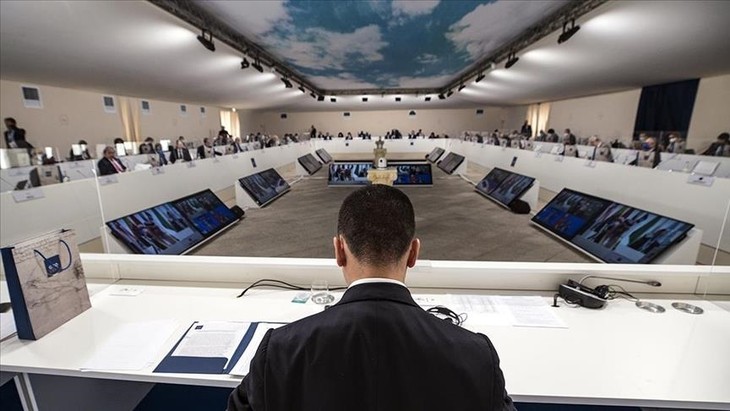(VOVWORLD) - Environment and Energy Ministers from the G20 convened their first ever meeting on climate in Naples, Italy, last week. Although the results were modest, the meeting was seen as an encouraging step in global climate change response.
 G20 Environment and Energy Ministerial Meeting in Naples, Italy on July 22. (photo: aa.com.tr) G20 Environment and Energy Ministerial Meeting in Naples, Italy on July 22. (photo: aa.com.tr) |
It was the first time in the G20’s history that its Environment and Energy Ministers gathered to closely analyze climate issues. That they managed to agree on some key issues is seen as an encouraging sign.
Positive results
At the end of the meeting, the G20 Ministers signed an agreement restating their commitment to the Paris Agreement (COP21) and approved a joint communique covering three key areas: to protect, preserve, and restore biodiversity, natural resources, and ecosystems and sustainably manage land, water, and marine resources by minimizing plastic waste; to effectively use resources, particularly in the fashion and textile industries, and increase environmental education and training that recognizes the interconnection of biodiversity and climate change; and to underline the many synergies in financial flows for climate, biodiversity, and ecosystems.
These actions extend the significant results achieved at the US-initiated virtual summit on climate change held in April.
At a press conference following the meeting, Italian Ecological Transition Minister Roberto Cingolan called the result "particularly ambitious”. He told reporters that this is the first time these things have been clearly written down and binding for the countries that produce 80% of the world's gross domestic product and 85% of its carbon emissions. He added that joint actions at all levels by the G20 nations will be needed to limit global temperature rise to 2 degrees Celsius or less and achieve the kind of sustainable post-pandemic economic recovery that will allow them to continue to respond to climate change.
 Houseboats have been hauled from Lake Oroville as drought dries up the California lake. (photo: AFP/VNA) Houseboats have been hauled from Lake Oroville as drought dries up the California lake. (photo: AFP/VNA) |
Various challenges
The G20 ministers meeting in Naples closed without a specific commitment to any global temperature target. Reducing coal exploitation remains one of the biggest disagreements between two groups: the US, Japan, and the EU countries on one hand and China, Russia, and India on the other. The meeting also failed to reach any consensus on reducing petroleum production because of opposition from petroleum exporters.
Before the meeting, several independent reports said the G20 has spent over 3.3 billion USD on fossil fuel subsidies since the signing of the COP21 in 2015. Almost every G20 nation has pledged to continue subsidizing fossil fuel production and consumption – up to 40-50% in some countries.
Analysts say there are a lot of things to be done and countries need to step up their efforts from now until COP26, which is scheduled to take place in Scotland in November. That is the deadline for 200 countries and territories to fulfill their climate change commitment within the COP21 framework.
UN Secretary General Antonio Guterres has called on the G20 to lead the global climate change response. He said the world needs a clear commitment from all G20 nations to limit global temperature rise to no more than 1.5 degrees Celsius by the end of this decade.